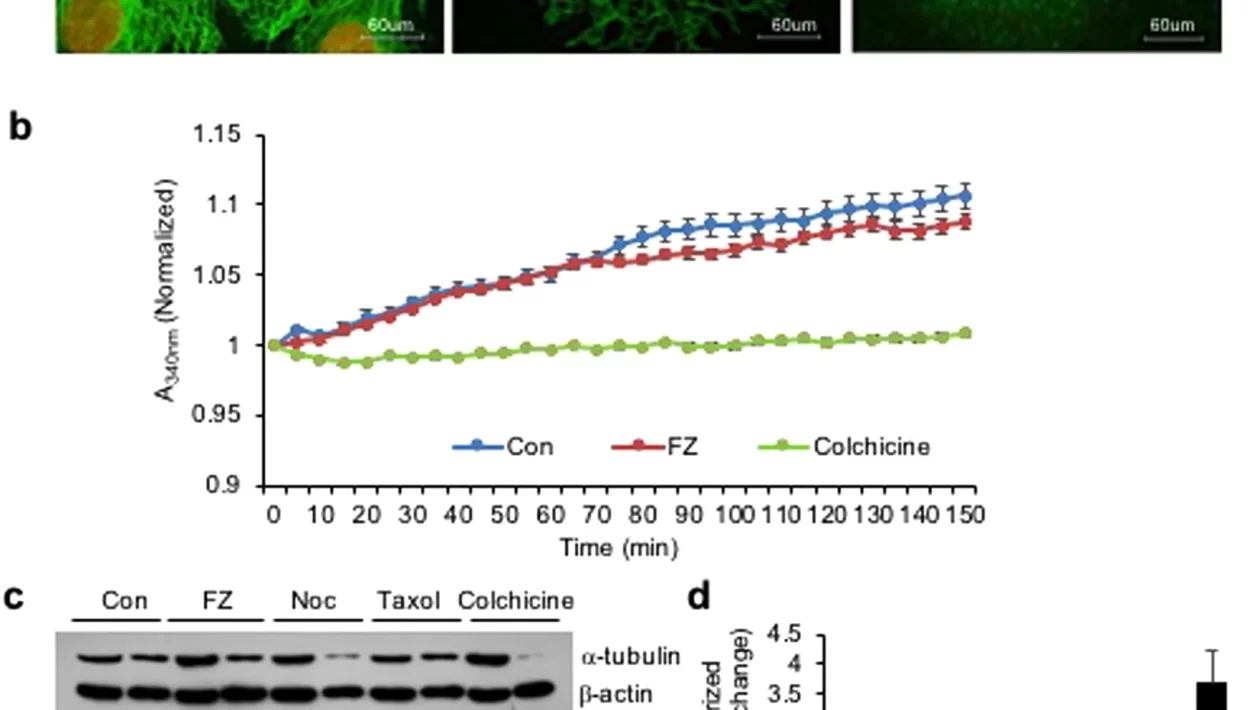Since the 1970s, it’s been commonplace to combat worm infections using fenbendazole, a medicine belonging to the anthelmintic family, recognized for its worm-expelling capabilities.
In a fascinating turn of events, recent scientific research and expert-reviewed papers suggest that fenbendazole might have an unexpected ally—cancer. The drug seems to show promising results against a variety of human cancer forms. Various theories have surfaced explaining why fenbendazole could be a new warrior in our fight against cancer:
Independently conducted research has started to reveal fenbendazole’s potential as a radical treatment for removing tumors in humans. These intriguing findings have been recorded and shared publicly to broaden our understanding of its potential uses.
For patients using fenbendazole, they may notice a deceleration in the advancement of their large B-cell lymphoma, renal cell carcinoma, bladder cancer, or metastatic illness. This could be attributed to the drug’s inherent ability to reduce inflammation.
While taking fenbendazole, there’s a faint chance of experiencing adverse side effects. But, it’s worth noting that these instances are considerably rare.
The accessibility of fenbendazole adds to its appeal. In the United States, it can be easily obtained from local pharmacies without a doctor’s prescription, further extending its reach to those in need.
Manufacturing Marvels with Minimal Resources
Interestingly, producing even the smallest quantities of a substance often requires surprisingly limited resources.
Previously, we explored the workings of fenbendazole and how its antitumor effects bear similarities to taxane groups, commonly used in chemotherapy. Remarkably, compared to other chemotherapeutic drugs, fenbendazole exhibits much lower toxicity. This could be attributed to its unique chemical profile and the distinctive impacts it has on various bodily systems.
The origins of most human cancers can be traced back to microorganisms, including bacteria, parasites, viruses, and other microbes.
Conversely, it’s widely understood that genetic predispositions and a compromised immune system foster a conducive environment for uncontrolled tumor growth. These factors tend to weaken the immune system, making it easier for tumors to flourish. This scenario rings true for a significant number of diagnosed cancer patients.
When conventional tumor therapies are dovetailed with extended chemotherapy or cancer treatment, there’s a prevailing interest in exploring drugs that can help combat worms, parasites, and lactate. This is driven by the potential that these drugs could enhance the outcomes of cancer treatments. Chemotherapy and other cancer treatments could, in turn, amplify the effects of such drugs, aiming to improve the holistic wellbeing of the patient.
Fenbendazole: A Frequent Choice for Parasitic Troubles
Fenbendazole is an antiparasitic medication frequently employed in the treatment of parasitic infections afflicting humans.
In comparison to mebendazole, fenbendazole initially found its use in addressing parasitic diseases and worms in animals, such as hookworms, whipworms, roundworms, and tapeworms. On the other hand, mebendazole was first developed specifically to tackle human infestations of hookworms, whipworms, roundworms, and tapeworms. Its effectiveness shone through when it was used in patients plagued with parasitic infections or worms.
Post its introduction, fenbendazole, marketed under the brand names Safe-Guard and Panacur, swiftly climbed to a dominant position in the pharmaceutical marketplace for antiparasitic medications. The studies conducted on both humans and animals revealed that the use of fenbendazole led to a significant reduction in the chances of developing cancer. This revelation was indeed groundbreaking.
The impressive effects of this treatment first came to light from a story of a man treated for a type of lung cancer called small cell lung cancer. His treatment protocol was rather unconventional, termed “worm eating”. Amazingly, post his treatment, he reported being cancer-free, adding another layer to the fascinating potential of fenbendazole.
Connecting Through Healing Journeys
Following his recovery, he set up a website and a Facebook group to foster a community where individuals battling chronic illnesses could share experiences and relate to each other’s journeys. According to his observations, fenbendazole held the potential to be an effective therapy for an array of health conditions. Among these were colon and prostate cancers, melanoma, stage four pancreatic cancer, and non-small lung cancer, to name just a few. The scope for its therapeutic applications might be even broader.
Recent years have seen a surge in research exploring the utility of various benzimidazole compounds, including fenbendazole, in treating human cancers. These compounds are packaged into drugs that have shown promise in the war against cancer.
It’s a well-established fact that both mebendazole and fenbendazole contain active ingredients effective against cancer. Yet, fenbendazole tends to be the more favored option. Despite their individual merits, they both carry active ingredients capable of making a difference.
Research Revelations: Fenbendazole’s Potential in Cancer Treatment
According to the findings of research carried out by the National Cancer Institute, mebendazole’s effectiveness in treating cancer seems to be lesser than fenbendazole’s. Fenbendazole appears to outdo mebendazole and other drugs in the fight against Cryptococcus neoformans, a fungus present universally and known to cause Cryptococcus meningitis in humans.
Drawing on data from various studies, researchers are now exploring fenbendazole’s potential as a cancer therapy. Laboratory studies have shown that the chemical components of fenbendazole can thwart cancer cell growth. This growing body of evidence suggests that fenbendazole might influence several molecular pathways, inhibiting cancer cell proliferation, and potentially leading to cell death. These revelations were published in the journal Cancer Research, building on previous research findings.
Taking our research findings collectively, they support the hypothesis that fenbendazole is a microtubule-disrupting drug with antineoplastic properties. If this hypothesis holds, fenbendazole could accelerate the death of cancer cells by interfering with a variety of molecular pathways these cells rely on, potentially leading to a faster demise of these harmful cells.
Fenbendazole’s Battle Strategy Against Cancer
According to researchers, fenbendazole eliminates human cancer cells by inhibiting GLUT transporters and dismantling microtubules, both actions impacting microtubule dynamics. This conclusion arose from intensive research into how fenbendazole interacts with human cancer cells. The theory is that the drug’s effects originate from the intersection of two distinct metabolic pathways.
Fenbendazole has been identified as the most potent inhibitor of GLUT 4 activity (glucose transporter isoform 4) currently available. Insulin is responsible for shifting the glucose transporter GLUT4 from the cell’s interior compartment to its plasma membrane, a process that is triggered by insulin. This shift results in increased glucose absorption. Fenbendazole can significantly diminish insulin’s impact on glucose absorption by reducing the trans-microtubule migration that insulin facilitates.
However, fenbendazole cannot be used as a substitute for other chemotherapeutic agents like vinca alkaloids due to the structural changes that occur when fenbendazole is metabolized in the human liver. This happens even though it interacts with the same area on tubulin as colchicine.
In the fight against cancer, fenbendazole is but one of several benzimidazole medications that could potentially augment the effectiveness of procedures like radiation therapy and surgery, as well as chemotherapeutic agents such as berberine and sodium dichloroacetate (DCA). Therefore, fenbendazole represents only one of the many promising benzimidazole class drugs that might boost the success of cancer treatments.
Awakening the Genome Guardian and Understanding Risks
Recent peer-reviewed research indicates that fenbendazole and related drugs may potentially awaken the dormant p53 gene nestled within our genome. The study posits that the anti-cancer properties of certain drugs could be attributed to the activation of this tumor-suppressing gene. Known colloquially as the “Genome Guardian”, p53 could halt the progression of existing cancers. Its tumor inhibiting abilities make it a potential line of attack against a wide spectrum of cancers, thanks to its inherent ability to suppress tumor development.
So, what are the risks associated with the use of fenbendazole in humans?
Typically, patients being treated for helminth infections receive fenbendazole in its pure form as a standard procedure. According to anecdotal reports, the risk of adverse effects associated with the oral administration of fenbendazole powder is quite low, even in single doses of 2000 mg and 500 mg over 10 days. This conclusion was drawn from a study conducted by researchers at the European Medicines Agency.
However, the evidence currently available does not significantly substantiate the idea that chronic use of the drug could harm one’s health. This could largely be attributed to the drug’s effectiveness in treating infections within the prescribed timeframe.
Fenbendazole’s Promising Role in Cancer Treatment and Prevention
The fenbendazole for humans, marketed under the Fenben Labs brand, has long been acknowledged as an effective cancer treatment and preventive measure. The near absence of adverse side effects suggests that these drugs appear risk-free, potentially usable in various scenarios.
Click the Facebook button to share this vital information with your friends. A link has been provided for your convenience to an external site. Just click the button to instantly share this article on Twitter and Pinterest as well. Sharing is caring, especially when it could possibly save lives. https://fenbenlab.com/shop/










